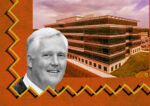Joseph Horn, an investor who bought a slice of a $47 million suburban Chicago office deal in 2017, has joined the herd of landlords attempting to outrun the higher interest rates putting much commercial real estate into severe financial distress.
Miami-based Horn has connections to the firms Bridge Loan Investments and Horn Eichenwald Investments, and failed to pay off a $12.7 million loan secured by the 258,000-square-foot One Northway Park office building in north suburban Deerfield when it hit its maturity date in May, he confirmed to The Real Deal.
“The market is terrible. You can’t find financing anywhere,” Horn said. “Maybe in a year from now the situation will be better.”
The debt is secured by the leasehold interest in the building, and Horn said his ownership venture continues to pay its ground lease rent to its partner on the property, a group called Kawa Capital with offices in Hallandale Beach, Florida and Aspen, Colorado. Kawa bought the underlying ground from Horn Eichenwald for $30 million after the Horn venture’s $47 million purchase of the property from Blackstone, and the ground parcel is encumbered by a $25 million loan that doesn’t mature until January 2028.
Rialto Capital, a special servicer for the 2019 loan tied to the building parcel, took over the debt’s management after Horn’s May payment default. The loan was originated by Deutsche Bank and then sold off to investors in commercial mortgage-backed securities, making much of the property’s performance metrics public. Special servicers like Rialto get activated on CMBS loans that fall into trouble, and can charge borrowers steep fees for failing to cure defaults in a timely manner.
Horn is hoping Rialto and the bondholders in the debt who it represents will allow for a two-year extension of the loan maturity, and, if granted, that interest rates and office building values will be more favorable to borrowers in 2027 and he can take out a new loan to pay off his old one.
He’s made a formal maturity extension request, but Rialto hasn’t yet made a decision, and the special servicer declined to comment, citing confidentiality restrictions. Kawa Capital also didn’t return a request for comment.
If he fails to notch the extra time to pay off the debt, Horn said he wouldn’t try to stop Rialto or the bondholders from taking over the ownership of the property. “They wouldn’t need to foreclose, I would give them the keys,” he said.
The stakes are high for the landlord. Horn said the ownership has put about $16 million into improvements of the Deerfield property, which remains well-occupied with a 200,000-square-foot lease to office supply company Essendant through October 2027, as well as other deals with smaller tenants.
“We have a cash flow and the cash flow is positive,” Horn said.
The property’s loan data shows it was 84 percent leased as of last December and brought in nearly $2 million in net cash flow for 2023, nearly twice the minimum to cover the property’s debt service costs. However, Horn said he’s unsure for now whether Essendant will remain in the building when its lease expires, or keep as much space if it does.
Many other suburban Chicago office owners have found themselves in similar or worse situations. Office vacancies reached another record high of 31.3 percent in the overall suburban market last quarter, the 14th straight quarter that vacancy has increased, as demand for workspace stays suppressed coming out of the pandemic’s shift toward remote work.
Amid the downturn, lenders have also filed several foreclosure lawsuits against suburban office landlords saddled with big loans, including at 1701 West Golf Road in Rolling Meadows — a three-building complex called Continental Towers where an $85 million loan fell off track — and, more recently, a $25 million foreclosure suit for a Pembroke IV-owned property at 2001 York Road in Oak Brook.
Read more


